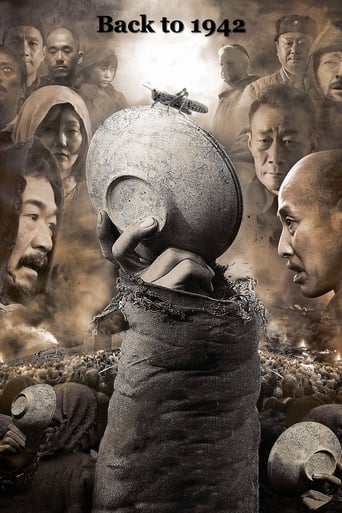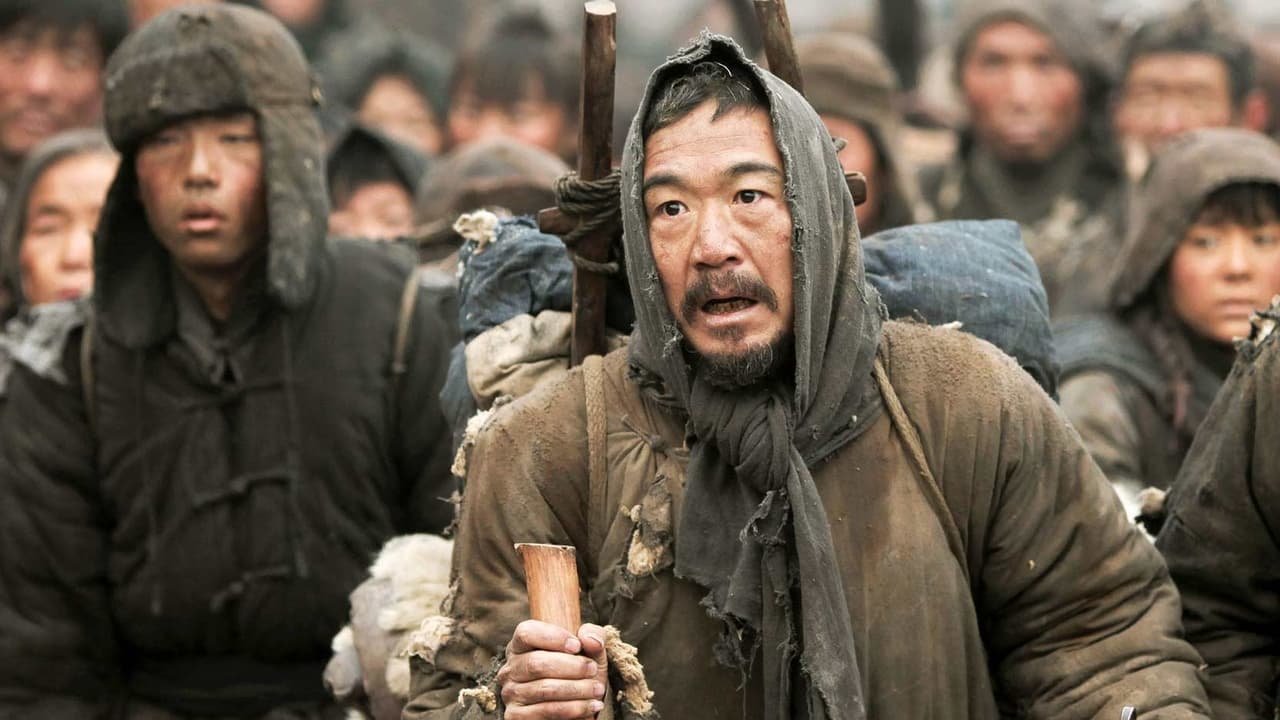Dai Xueyan
the bad: there is a lack of a decent plot, the movie is more an assembly of different episodes that happened during the famine, told through the eyes of a former landlord and his family. Unfortunately most (if not all) of these episodes are cliché' and predictable (there is a pregnant woman, guess when she will deliver; there is a girl with a cat, guess what will happen to the cat; there are corrupt officials out to buy women for their own pleasure, guess who they will buy;). The episodes told are so many that there is no time to sympathise for a character, or at least that was my feeling. Most scene are a brutal graphic depiction of what hunger is, but I found it less involving than, for example, Fires on the Plain. the good: the subject treated is historically important, especially the fact that the government was aware/unaware able/unable to do something to prevent this catastrophe. The action scenes (the bombing of civilians) are shot with mastery and makes you feel uncomfortable all the way through. What I found more interesting though (but haven't seen anybody pointing it out so far) is that Feng Xiaogang is indirectly (and very subtly, of course) criticising todays government. There are many parallels with what is happening now in China, the top leaders who lost touch with the people, corrupt officials who take money and women, foreigners who have to point out faults of officials, Chinese against Chinese with their insatiable hunger for wealth. Even the Japanese, though enemies, are depicted as more human than the Nationalist officials. The Ugly: Tim Robbin's role, or the whole religious part for that matter. It doesn't add anything to the, already thin, plot. Also why Christians and not Buddhists or Daoists?Overall it's an interesting movie to be watched, not only for the famine, but also as a new step for Chinese cinema becoming more international.6/10
DICK STEEL
With big budgeted films like Assembly and Aftershock under his belt, Feng Xiaogang is no stranger to ambitious films set against the Chinese historical backdrop, which he handles most excellently through powerful, emotional dramas, balancing it out with what would be money shots of the large event that forms the canvas of his movies. With Aftershock he dealt with the Tangshan earthquake of 1976, Assembly had his war between the Communist and Nationalist soldiers, and now he goes a little further back in time to 1942, where China's Henan province suffers through its deadliest drought resulting in the death of 3 million through starvation.I guess it's quite challenging for many here to have experienced true hunger in today's relatively affluent society, but those who have been through some days without having to eat something, usually through vanity reasons of keeping artificially slim, will attest to an uncomfortable feeling. Multiply that by months on end, with a war looming and then experienced, and one can almost picture how miserable life then would have been, with food being literally scraped from what would be unthinkable as food, such as tree barks, and many willing to offer anything, most often children, as barter trade for foodstuff.Based on the novel by Liu Zhenyun titled Remembering 1942, it charts the huge drought and famine through one of China's provinces, told through the eyes of various protagonists in this sprawling epic. There's a well to do landlord in Master Fan (Zhang Guoli) who opens the movie, as we bear witness to his slow and inevitable descend from prince to pauper, having a stockpile that got naturally targeted by bandits, and when all hell broke loose, he suffers tragedy after tragedy, joining the millions of others on their trek westwards to find food, and also incidentally escape from invading Japanese forces.Then there's the religious arc, with Priest Sim (Zhang Hanyu), a Chinese man seeing opportunity in all these distraught to spread the word of Christ amongst his fellow countrymen, with his faith being shaken by constant questions how his God would have allowed this to continue, where at one point he had envisioned this situation to be similar to Moses' leading of the exodus out of Egypt. Tim Robbins and Adrien Brody also took up roles in this film, much like Christian Bale in Zhang Yimou's The Flowers of War, with the former being the priest whom Sim confides in, and the latter playing the role of a Time magazine correspondent who also lends his perspective to the growing atrocities, and ignorance of the many politicians who prefer to enjoy the company of elites, and turning a blind eye to the true situation thousands of miles away.While the film does not offer pointed accusations, it does present a series of events that may have contributed to the immense human tragedy, and this largely involves politicians, soldiers and the Japanese, where WWII almost becomes an excuse for the existence of millions of refugees uprooting themselves and moving elsewhere not only to escape from enemies, but to look for sustenance. Director Feng engages some of the best in the craft for this ironically lush production (for a film that deals with those with absolute nothingness), to bring out vivid looking shots and conditions in which the actors thrived in delivering heartfelt performances, with no holds barred effort poured into the production to make every shot look believable, plausible, succeeding in its attempt to put you right where the action unfolds.War and battle scenes also looked notches above what the director had done with Assembly. Blood and gore moments were kept realistic without the need to be gratuitous, from major scuffles amongst bandits and villagers, to constant Japanese air raids which saw bombs raining down indiscriminately against both soldiers and the long lines of civilians trying their best to escape from hunger, now having to deal with another threat which some see as a lifeline to end their miserable lives. But if looking from yet another angle outside from the premise of the film, the narrative also deals with the adage of fortunes being cyclic in nature, telling such a story where a rich man's most prized possession will be that final slap in the face when Maslow's basic theory of needs come into play, like a warning to the newly affluent that when it boils down to survival, it's every man for himself, with the elite class likely to suffer the most when the people trodden upon calls it quits.Chinese films have come a long way over the last decade, and Feng Xiaogang has shown that he's amongst one of the best out there to deliver big budgeted productions that doesn't have to void of a soul or emotional core. It's an epic on the grandest scale, succeeding because it tells stories of the human condition that everyone can identify with. Highly recommended, as I ponder what other historical backdrop the director would be tackling next, since he has a keen eye and a knack for it!
Mozjoukine
Feng Xioagang can be considered China's - possibly Asia's - most substantial film maker. His output is increasingly imposing and his box office clout means that the content of his work must come under intense official scrutiny. That made the IF I WERE THE ONE movies quite amazing as an expression of the notion that to be rich is glorious.BACK TO 1942 is clearly a tent pole movie for the Chinese cinema and then carries a double load. It is an intense, long, demanding account of the 1942 Hunan famine and refugee exodus, made more terrible by the parallel war with the Japanese and also a revision of history with Chiang Kai Shek now shown as both calculating and remote, as well as caring and authoritative but only a support player in the story of the land lord and serf reduced to destitution on their awful journey.Intriguingly, Theodore White writer of sixties Wolper Documentaries and "The Mountain Road" shows up effectively in the person of Adrian Brody, as a character.Master crafted, some of the staging is exceptional. The bombing raids are great set pieces and the film manages to keep disaster chic in hand, even if it's so grim.Essential for the serious movie goer, a strain on the casual entertainment seeker.
lancequan2046
A tamer version of my review in desensitized words: Good film, could've been a great film.A rather controlled and somber depiction of a dark chapter in modern history, subtly echoing another tragedy that happened 16 years later. Surprisingly un-judgmental and un-sentimental for a historical film recreating despair and lowest possible form of human existence.Feng presents the multiple layers of clues and facts that lead to the ultimate tolls almost as-matter-of-factly, leaving the audience putting together the puzzles and drawing their own conclusions, which is a rather clever way of avoiding censorship and engaging the audience.Could have been A LOT grittier and more affecting. The acting is powerful in this film. However for a film depicting a major famine that claimed over 3 million lives in recent history, not much huger is shown as visuals in the film, most of the lingering hunger is talked about/acted out (as opposed to being displayed visually) which reduces the general affecting power of the film.Xu Fan and Zhang Guo-Li are amazing in this film with their acting. Xu gives her most powerhouse performance yet, portraying the tough bottom- feeder hillbilly b*tch who would attempt anything/everything in defending her and her family's rights to live. However for a country woman who's been starving for over 100 days and more than willing to sell her bottom half for a couple of crackers, what's with her double- chin? (think Jennifer Lawrence's face in The Hunger Game – she can act all she wants but I'm sorry, girlfriend is just NOT that hungry) What TF happens to her makeup artist team and special visual effects people?!Adrien Brody is effectively engaging as a very eager T.H. White who's desperately trying to expose the truth, whether driven by his journalist instincts, Pulitzer, or a genuine sympathy for the poor and depraved. However don't even get me to start with Tim Robbins - why is he even in the film??? The couple of scenes he's in are cringe-inducing. Even if you edit them out altogether it would not affect the story's flow whatsoever.


 AD
AD


